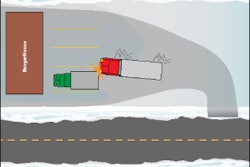To survive the recession of 2008 and 2009 fleets had to lay everything on the table to become lean. Technology spending was frozen, but as freight volumes recovered, they began to look for ways to add value for customers and operate more efficiently.
Renting versus buying technology become the new standa
 John Elliott, president of Load One, with a driver. Load One uses several cloud-based software systems and has a completely virtual IT network.
John Elliott, president of Load One, with a driver. Load One uses several cloud-based software systems and has a completely virtual IT network.rd as the Software-as-a-Service or cloud computing model generally is more cost-effective. Vendors host software remotely and forego the annual licensing and maintenance fees in lieu of a monthly subscription that includes all future software updates, data storage and IT support.
Load One is one of many fleets that have moved IT services to the cloud. The 350-truck expedited freight provider is using cloud-based software for its dispatch and voice-over-IP telephone systems. Onsite servers are used for e-mail, accounting and other applications that require a higher level of security and control, says John Elliott, president of the Taylor, Mich.-based fleet.
Along with cloud computing, Load One has moved its IT systems to a “virtual” environment. With this strategy, Elliott and his employees have instant access to an exact replica of their office workstations from any PC or mobile device with an Internet connection.
With this virtual desktop technology, employees can use Microsoft Office and other applications, along with their files, from any mobile device – all in the same native format they would appear at work. If someone left the office with five windows open on his desktop PC, those same windows would appear when he logged in to his virtual desktop from an iPad.
Besides lower cost and greater accessibility, cloud computing can put companies on the fast track for integrating their systems through Web services.
Load One is using a feature in its Sylectus dispatch software to automate invoicing. The software extracts satellite tracking, images of delivery documents and other data from another cloud-based system, the Qualcomm MCP 200 onboard computing platform. The fleet is able to present customers with an invoice almost immediately after delivery.
If there is a downside to cloud computing and virtualization technology, it is that businesses have more data pouring in from mobile devices. Overall, the amount of Internet data is expected to grow by 50-fold over the next decade.
Another potential downside of cloud computing is having data in separate databases outside the customer’s walls. At some point, it will become necessary to create a single database – a data warehouse – to consolidate and analyze data across an enterprise.
During last month’s CCJ Fall Symposium in Scottsdale, Ariz., Jim Sassen, Qualcomm’s senior product marketing manager, gave a short but insightful presentation about the progression of cloud computing in the transportation industry.
As more data is going to the cloud, data analysis actually requires fewer human and IT resources, Sassen said. Many vendors have created analytical tools such as scorecards and executive dashboards that make it easier to consume information, but the future of “Big Data” belongs to predictive analytics, he said.
Some of the largest fleets in the country now are using a cloud-based service from Qualcomm called FleetRisk Advisors, a service that brings in hundreds – even thousands – of data elements from an enterprise and predicts future outcomes, such as which drivers will be in an accident or leave the company within the next 28 days.
Starting with the March 2013 issue of CCJ, look for more success stories of how fleets, both large and small, are migrating more IT systems to the cloud and using advanced tools to gain insights from their data to solve complex problems in operations, safety, profitability and other areas. CCJ will begin a three-part feature series on “Big Data.”
After all, what really matters is not the volume of information you generate – but how quickly and effectively you can use it to control your destiny.










